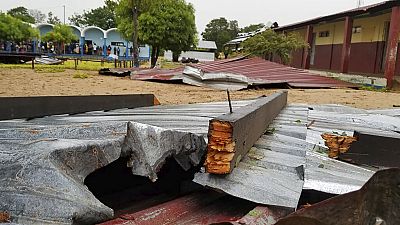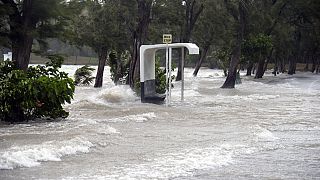Madagascar
Still recovering from the effects of the first battering, the southwestern African nation of Mozambique is bracing for a rare second hit by long-living Tropical Cyclone Freddy late on Friday night, a regional weather centre said Tuesday.
The United Nations' monitoring station on the Indian Ocean island of Reunion warned that Freddy will "gradually intensify to the stage of a tropical cyclone or even an intense tropical cyclone" over the Mozambique Channel before making landfall overnight on Friday into Saturday.
Freddy is expected to intensify this Thursday as it approaches coastal Mozambique, with current windspeeds at sea averaging 110 kilometres (around 70 miles) per hour, gusts of 155 kilometres (around 100 miles) an hour, and barreling in the northeasterly direction. It is projected to make landfall on the country's second most populous province of Zambezia.
Its reemergence has baffled meteorologists with its constant shift of direction and multiple record-breaking feats. Freddy has intensified four separate times, a first for a tropical cyclone in the southern hemisphere. It also now holds the world record for what's known as "accumulated cyclone energy," a metric to gauge a cyclone's strength over time.
Freddy hammered eastern Madagascar last month before moving across the channel and slamming Mozambique, killing 21 people across both nations. The deluge affected approximate 213,000 people and destroyed over 28,000 homes in the Mozambican capital of Maputo and nearby provinces, according to Mozambique's National Institute for Disaster Risk Management.
It then appeared to have dissipated before it reemerged, looping around the Mozambican Channel. It was initially destined for Madagascar for a second time but shifted course back to mainland Africa.
French weather agency Meteo-France said in a bulletin Tuesday that as Freddy gathers more pace, it also poses severe weather risks to Toliara, the capital of Madagascar's Atsimo-Andrefana region, with strong winds and the sea remaining "dangerous due to the cyclonic swell." Freddy is currently soaking southern Madagascar as it hovers over the channel.
The U.N. weather agency said Freddy is on course to become the longest-lived tropical cyclone in history after traversing the entire Indian Ocean for a month.
November to April is classified as the cyclone season in the southwest Indian Ocean and climate scientists say that climate change is intensifying cyclones, making them longer, wetter and more frequent.












01:29
COP29: Activists make final push for a finance deal up to the challenge
Go to video
2024: Deadliest year ever for aid workers amid global conflicts - UN says
01:40
Kenya cancels airport and energy deals with Adani group after the U.S. indicts the tycoon
Go to video
Fugitive Zambian MP Emmanuel Jay Banda arrested in Zimbabwe after three-month Manhunt
Go to video
Spain to offer residency and work permits to undocumented migrants
Go to video
Archbishop of Canterbury will end official duties in early January amid sex abuse scandal